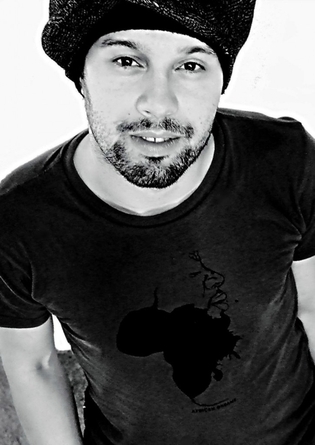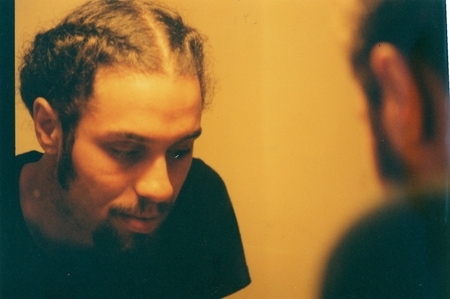Lacki Interview
Interview de Lacki par Art JEFFERSON

Words-Art Jefferson
Photography-Ndjiy, G.MTIMET
Sounds from the root is what Lyon, France based percussionist Lacki composes.
Most would probably simply categorized the music as “world” but that terminology seems to skip over the details, layers and practically the brilliance of the music that this artist makes.
Combining African rhythms, Roots and Jazz, the drums are clearly the heat beat of the body of songs, once again stemming back to the origins.
As a teacher, Lacki has taught music lessons in various Jazz conservatories and has even been requested by institutions for the handicap in France and England.
Currently he been busy working with other artists including London artist Renu, not to mention he is in demand by operas and theaters to help compose pieces.
Indeed Lacki is an embodiment of the arts.
AJ-Tell me about your musical history. At what age did you began to discover your love of music and when did you began making it?
Lacki-I think that since I was a little child, I’ve always been pretty receptive to the noise, the sounds, the music.
At home, there was always music from traditional tojazz and classical music.
My grandfather, in particular, played various percussions and the Imzad (an old traditional monochord).
He taught me the drums, but with them the patience, respect and strength of some silences. My grandmother was a storyteller.
With it, no doubt, I learned from her a little about the power of narration and how to listen better.
As a result, very quickly, pace has become my favorite medium as a sort of catalyst for the sensitive sounds.
AJ-In my opinion, your music reflects a strong sense of culture, roots and passion. How would you describe your sound?
Lacki-That’s right. I am bound to a certain genesis and there is probably a sense of belonging distilled in my music in various ways, yet I am conscious of being the result of a blend, both physical and cultural.
I like to think it’s a whole, and not some subdivisions of identities.
In this sense, in my music, I want at the same time, differents climates, differents colors and atmospheres, also to occur while seeking consistency without falling into the cliches of the merger for merger.
What is difficult, of course, is to find some meaning and real relevance as much as possible.
I come from traditional music, but naturally when I was a teenager, I became interested in electronic music and the various tools that arrived so gradually (samplers, softwares, etc …).
I knew absolutely nothing of that, so it was just exciting.
What matters to me more than anything is transmission, but even more the wholesome development of these elements that allow the evolution of societies and their mutations.
So, what struck me is that for the first time probably in the history of music, musicians would probably now be more dependent on new tools beyond the usage of their own only instruments.
In some ways, that would give perhaps immense opportunities of overtures for the average artist, but on the other hand there was the question of citizenship and access to the necessary means, in any “freedom” and a true “feasibility “.
In this context, for example, I discovered and supported software in open sources and free licences that are now offering an alternative for artists who need them.
When I compose, I try to do everything that I can to obtain resolutely an “acoustic feel”.
My wish is to use loops, machines, or electronics, into the service of a certain musicality, a certain sensibility.
AJ-As a percussionist, you work with different artists performing various styles of music.
Tell me about some of the artists and projects that you are currently working with.
Lacki-This year, it so happens that I am currently working on various projects and collaborations.
Currently I work mainly with cultural institutions such as, the opera, the theater, and several dance house, choregraphic centers, and also visual artists, who desire soundtracks.
I remember in particular some beautiful experiences, during performance with Yaze, an artist who comes from a background of graffiti art and is working on the Free Disfiguration.
I did an adaptation for a slam of “Canon and Gigue in D major” byJohann Christoph PACHELBEL for a choreographer from Cameroon.
And in the fall, I worked with an Indian percussionist and expert of tablas, who lives in London named Renu on her album.
For me it was a real opportunity to discover a little more about the Indian rhythmic forms, otherwise known as as Teental.
This experience gave me an opportunity to approach the refined poetry of those musical patterns.
AJ-You’re also a teacher of music if I’m correct.
You have worked in institutions in France and England.
Talk a little about the studies that you teach.
Lacki-Yes, I’m engaged with different schools of jazz and conservatory.
In this context, we work more specificallywith the notions of polyrhythm, their genesis, and how they can release the work on the harmonies.
The rythm is often for me, as the basis of everything.
Music, the scheduling of the molecules, the development of the cosmos even, possess an rythm, even if as dysfunctional or strange as he may seem.
Moreover, I see often, in the institutions that specialize in music education, many students who are not really aware of their corporeality, rhythmically speaking.
It may sound paradoxical when their level of theoretical abstraction is often large enough.
So often we work on understanding and learning of polyrhythms, dedicated to the independence of the hands and feet for example.
I’m also engaged with musical workshop, in institutions for the handicapped.
The workshops are under the supervision of therapists.
However, those moments have not only a vocational therapy, but occupational as well.
The goal is mainly to create a space where all personalities can come together, can take the speech, and express themselves through rhythm.
Sometimes (and I love this very much) this learning is more like a game, and very far away from all academia.
And indeed, it’s with them that I learn the most.
AJ-These days, what inspires you when you create music?
Lacki-Maybe, the ephemeral. Often that has a negative connotation. But as far as I am concerned, this is the very character of life, and it’s a happiness that all things pass.
AJ- Finally, can you talk about any current musical works that you are involved in?
Are you working on a new album? I’m sure you have tons of shows coming up.
Lacki-Not a lot of scenic events at the end of year, so I can devote myself to the work of creation and studio sessions that my various commitments require.
Indeed, I will be very happy for the coming year to devote myself to writing an album.
In reality, for a long time I never even thought of it.
I did not feel ready, despite the number of commitments that I have had.
I told myself little by little that to record my compositions could also be the delicious occasion to bring together in one place the people who count the most in my musical universe.
Lacki website